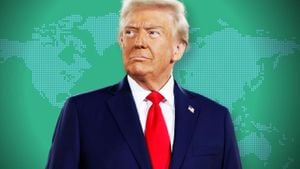Israeli Prime Minister Benjamin Netanyahu is facing the possibility of arrest if he steps foot in the United Kingdom, following the issuance of an international arrest warrant by the International Criminal Court (ICC) due to alleged war crimes committed during the Israel-Hamas conflict. The UK government has stated unequivocally its commitment to adhere to its legal obligations under the International Criminal Court Act 2001, which mandates compliance with ICC warrants.
On Thursday, the ICC not only issued warrants for Netanyahu but also for his former Defence Minister Yoav Gallant, citing crimes against humanity linked to actions taken since the onset of the Israel-Hamas war. The warrants have sent shockwaves through the political landscapes of several nations, straining relationships and prompting varied responses from world leaders.
Downing Street has been particularly cautious, with Prime Minister Keir Starmer's spokesperson noting, "The UK will always comply with its legal obligations as set out by domestic law and international law." When pressed on whether Netanyahu would be detained if he entered the UK, the media was met with non-committal answers, emphasizing the government's intention to uphold legal duties without getting involved in speculative discussions about individual cases.
Meanwhile, officials confirm the processes related to executing ICC warrants are strict. An arrest request from the ICC must be transmitted to the appropriate judicial officer, who then reviews it to assess its legitimacy before it can be enforced. This protocol has not yet been invoked since no individual charged by the ICC has visited the UK up to this point.
Prime Minister Netanyahu, along with the State of Israel, has staunchly rejected the ICC's accusations. Following the warrants' announcement, he called the court's actions "antisemitic," framing the legal decisions as part of a broader effort to delegitimize Israel. Hamas, on the other hand, has embraced these warrants as validation of their stance against the Israeli government.
The international reaction following the warrant issuance has been mixed. Canadian Prime Minister Justin Trudeau also articulated his government's commitment to abide by the ICC's decision, echoing the UK’s sentiments about supporting international law. “We stand up for international law, and we will abide by all the regulations and rulings of the international courts,” Trudeau affirmed during public comments.
Conversely, the United States, which has traditionally stood by Israel, has reacted more critically. President Joe Biden deemed the ICC's move as "outrageous" and asserted there is no equivalence between Israel and Hamas, distancing Washington from endorsing the court’s decisions. This position aligns with support from some factions within the U.S. government but starkly contrasts with more progressive voices like Senator Bernie Sanders, who has reaffirmed the need for accountability concerning the consequences of military actions from all parties involved.
The principle of universal jurisdiction under which the ICC operates affects many nations differently, and its member states vary widely concerning their willingness to act on its warrants. Countries including Belgium, France, and several Scandinavian nations have pledged support for enforcing the warrants, whereas Hungary, the Czech Republic, and other nations have explicitly refused to comply. Hungarian Prime Minister Viktor Orbán went as far as inviting Netanyahu to visit, showcasing outright defiance of the ICC’s decisions and bolstering his alliance with Israel.
The ramifications of these events stretch beyond the courtroom, affecting diplomatic relations as nations navigate their internal politics and international commitments. Ireland, for example, reaffirmed its plan to arrest Netanyahu should he set foot on its soil, underlining the tension within the EU on responding to the warrants. The Irish Prime Minister, Simon Harris, responded resolutely, confirming, "Yes, absolutely,” when asked about their intent to detain Netanyahu.
The sentiments around the ICC's warrants also highlight the increasing polarization of international opinions concerning the Israeli-Palestinian conflict. Balloons of hope have emerged among some Palestinians who view the ICC's actions as potential steps toward justice, particularly following extensive humanitarian crises reported from the Gaza Strip. The possibility of international leaders being held accountable has ignited conversations on ethical governance and the protection of civilians during armed conflicts.
While the climate of political tension and rapid developments surrounding Netanyahu's potential arrest continues to evolve, discussions on broader issues—such as humanitarian aid access to Gaza and the prospects for peace—are gaining urgency and prominence. Countries participating in future diplomacy will need to reflect on their positions and actions concerning accountability and justice on the global stage as they address the far-reaching consequences of the conflict.
Discussions among G7 countries are expected to take place next week elaborately focusing on ICC's impact and to decide on unified stances moving forward. Such alliances and discussions will inevitably shape future engagement strategies with leaders from Israel and the Palestinian territories.
Prime Minister Netanyahu, Israel's longest-serving leader, now stands at the center of intense scrutiny—not only for his policies at home but as figures of international legal proceedings loom large over his potential travels abroad. Whether or not he adjusts his diplomatic engagements will be closely watched by both supporters and critics globally.
Against the backdrop of burgeoning international dialogue on accountability, civil rights, and the rule of law, the next steps taken by involved countries, particularly those compliant with the ICC rulings, will reveal the weight and seriousness of these legal processes, and how they might influence the dynamics of Middle East politics and beyond.



